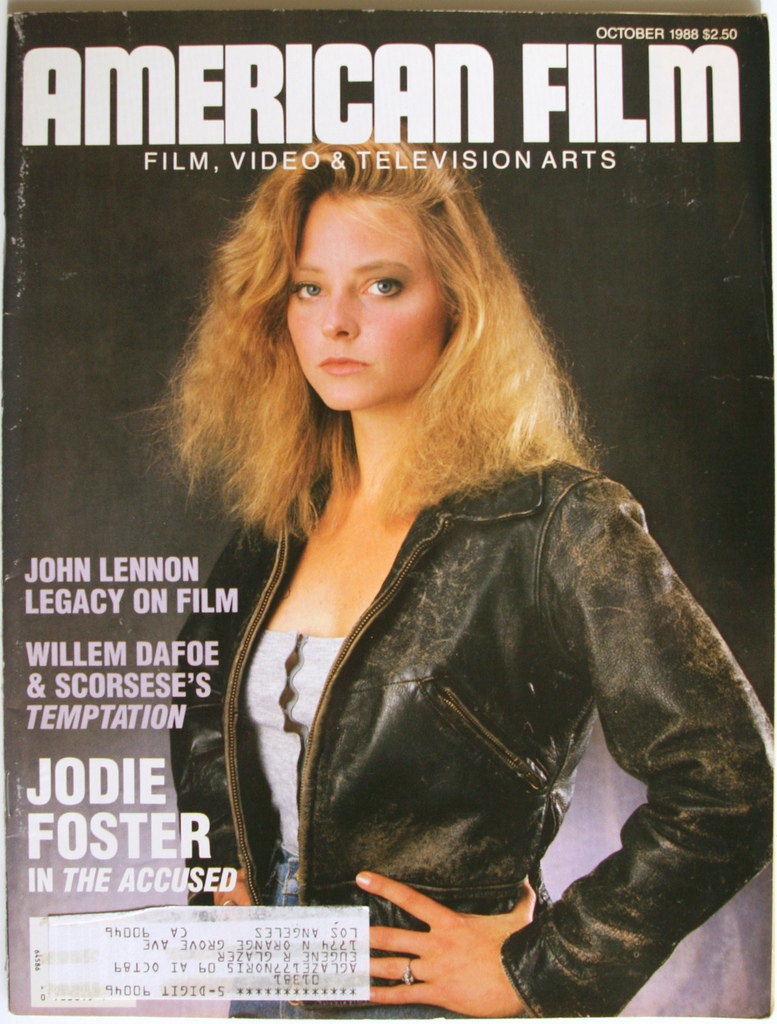Alexa here, kicking off the Jodie Foster celebration. In hearing that Jodie Foster turns 50 on Monday I was reminded of this old issue of American Film I have that includes an interview with her when she was only 25 and promoting The Accused.
It was a transitional time for her... [continue]
The Accused marked her first real meaty, adult role, but despite this she still hadn't shaken off all the interest in her ordeal with John Hinckley Jr. or her childhood roles. And while she represented the most self-assured of young actors out there, she still managed to be intimidated by her Juilliard-trained costar Kelly McGillis. Here are some excerpts.

On her plans to direct:
Like nearly everyone else in Hollywood, her future plans include writing screenplays and directing. But the professionals in Foster's orbit insist she really does have the self-assurance and determination to make it happen. "Of all the actors I think would make great filmmakers," says Jonathan Kaplan, director of The Accused, "she's the one who will actually do it."
On the audition process for The Accused and reluctance to cast Jodie:
No one flung down a welcome mat outside of The Accused production offices when Foster became interested in the part. In fact, producers Sherry Lansing and Stanley Jaffe were reportedly resistant to casting her in the role, though neither of them remember it that way. "You have to put it in the context of wanting to choose the best person for the part," says Lansing. "When Stanley first met with Jodie, she had been at Yale for all these years - no one had seen her."
Foster's version [of her audition] illuminates the canny self-assurance of a Hollywood veteran: "I would never wear anything overly 'babe' to a reading. It's like putting on a postman's hat at an audition to play a postman; it's tacky. I thought they wanted to see a tough girl. So I wore a black sleeveless turtleneck, black jeans, and cowboy boots. I wasn't prepared at all for that stupid screen test. I didn't know any of the lines. [Jonathan Kaplan] threw me in a room for ten minutes and I learned a five-page-long monologue."
But in Kaplan's mind at least, their reluctance had little to do with how well suited she was for the part. "It was obvious from the very first frame of the screen test that she was great in the role...but a factor, I think, in everybody's mind was the baggage she would bring to the role. Like, the fact that she'd been through the whole Hinckley thing might be distracting for the audience."

On the Hinckley ordeal:
"it was a very weird time," she begins tentatively. " I was doing two weekends of a play [Marsha Norman's Getting Out]. One weekend happened and then...Reagan got shot...and then I had to go back and do the next weekend's [preformance]. It was, uh, standing room only. And the odds were against anybody [in the audience] getting the play...that's not why they were watching."
One of the post-Hinckley problems was that she now had security men assigned by Yale to protect her. How do you slip out of the spotlight and back into the student population when you're traveling en masse? "I'd be sitting in the library," she sighs, "and people would run the gamut of human responses. Some people were wonderful, and the there were the five percent that...fulfill your worse nightmares of how people react under the circumstances."
On her mother:
"I could pick a friend and take them with me [on location]," Jodie admits. "But they would be a bad influence on me. Meaning, they would make me drink, or go out, or not get any sleep...My mom, she keeps me stable...and centered."
On making The Accused:
The experience of making The Accused turned out to be a prolonged and exhausting weight on her shattered emotions. Her self-trained confidence was derailed by co-star Kelly McGillis's precise Juilliard technique ("Ask her to cry and she can say, 'How much? Which eye? When?'").
This period of personal bewilderment aside, Foster discovered that not always being in charge could have an exhilarating effect on her work. "I think [The Accused] really turned me around ," she says. "Acting shouldn't be your own form of therapy, but at the same time it makes you grow up. For a couple of weeks, I thought [The Accused] was too challenging for me - it made me feel as if I wasn't a very good actor. But now I'm kinda proud that I got through it, that I'm not wearing a big white strait jacket and going like this," says Foster, wrapping her arms comically across her chest and making a crazy face. " I think this film really changed how I looked at acting. I could finally look up and say, 'Oh. This is what I want to do when I grow up.'"
